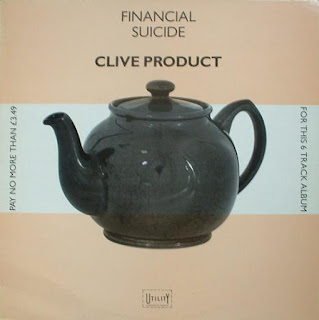Clive Product – Financial Suicide (1988)
In 1988, Clive Product became the second artist after Billy Bragg to appear on Utility Records (which had originally been formed as part of Charisma). Billy’s 1983 release Life’s A Riot with Spy vs Spy had been the label’s first release (UTIL 1), but there wasn’t a UTIL 2 until Financial Suicide came along in 1988. By then Utility was owned by Billy and Peter Jenner and they were trying to showcase independent acts which had tried hard, but so far failed, to break through. Clive fitted the bill perfectly, having already released four albums, to no appreciable commercial success.
Financial Suicide was a six track compilation mini-album, taking tracks off Clive’s earlier LPs. So we have Shoddy Body and Songs From An Untidy Bedroom (from Songs From An Untidy Bedroom (1986)), Everyone Sees What I See and The Man Who Thought He Was a Steam Train (from The Care Assistant (1987)), Penguins (from Village Tours Start Here (1983)) and a track that Clive released as a single, There Goes The Floor Again. The CD of this mini-album added Two Fat Girls (also from The Care Assistant).
I love this album and still play it regularly. Clive produces great eccentric, acoustic pop music – memorable hooks and a lot of humour. The album opens with an up-tempo song I can really relate to - Shoddy Body. “I’ve a shoddy body, you’ve a shoddy body, there isn’t anybody who hasn’t got a shoddy body”. As Clive says, “nobody’s perfect.” Why that wasn’t a top ten hit I don’t know. Everyone Sees What I See, is a bit more chaotic, another self-deprecating song (“don’t tell me I’m special”) all driven along by a virtuoso violin. “There goes the floor again, opening beneath my feet” – another downer of a song – sounds like Clive had a bit of a self-esteem problem when he was younger. Great melody though. The Man Who Thought He Was A Steam Train sounds like the title of a book by Oliver Sacks. An upbeat tune, about a chap shuffling around a care home living out the life he wanted inside his head. Penguins is a haunting mournful ballad, an evocative and slightly eerie song. So, it’s a good job the mood is lifted by Songs From An Untidy Bedroom, which is one of my favourite tracks of all time. It’s a warning not to lose the idealism and vitality of youth, with a driving beat and a catchy tune. “I still believe in cheap guitar strings sounding just as good on a cheap guitar.” The CD bonus track, Two Fat Girls is perhaps a little politically incorrect, but a nice bit of observational song writing.
I utterly fail to understand why Clive never broke through. In 1990 Clive relocated to Berlin and produced one more LP (Fate On A Plate) in 1992. Between 1993 and 1997 he wrote and edited the fanzine Big Untidy, which eventually led to the publication of a book in 1999, Beautiful Extremes: Conversations with Kevin Coyne. It’s difficult to be definitive about what he’s been up to since then, as his web page has disappeared, but he does crop up from time to time. It appears that Clive has recorded several albums worth of new material, including Shooting Stars (2000) and Skeleton Songs (2002), but I have been unable to track down any copies. An acoustic EP, Broken Pieces, was released on 9pm Records in 2004. Clive has also toured and recorded as part of The Anglo-German Low Stars. Their film soundtrack album The Night of The Amazon was released on 9pm Records in 2001 and it looks like they recorded at least one EP (The Dead Grandmas of Potsdam (2005)). I also have No One Should Drink Alone which is an album Clive did with Grae J Wall from 2006 and the (sadly abandoned) Big Untidy website mentions he was recording an album called Like the Tide Coming In (many of the tracks of which are even now still available on what is left of Clive’s myspace page). But there’s not a lot of recent information out there.






